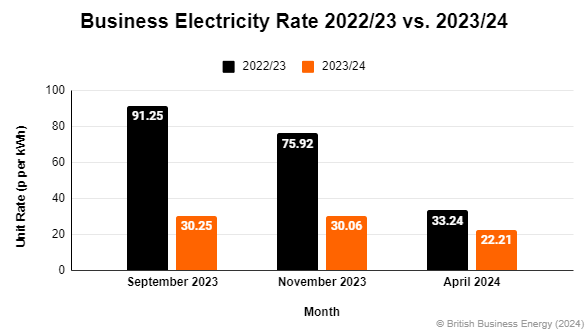Compare Business Electricity Rates
Why Pay More for the Same Business Electricity
Compare the latest business electricity prices & complete your switch online!
What would you like to compare today?
Lowest Unit Rates
Lowest Standing Charges

Compare Business Electricity Rates From Top UK Electricity Suppliers
Everyone likes to save money, and that’s no different for businesses. We’ve helped UK businesses of all sizes save money when comparing business electricity rates, whether that be bespoke built tariffs or online self-service switching.
We specialise in finding great business electricity rates to help you take control of your bills.
Get better business electricity rates within 30 seconds!
Compare DealsWe Have Completed Over 350,000 Business Electricity Switches All Over The UK.
Building strong relationships with some of the UKs leading business electricity suppliers helps us secure great deals for our customers. In some cases, we can even offer exclusive business electricity rates to our customers that are not available if you approach the supplier directly.

Comparing Business Electricity Rates Is Easy
Compare
The latest business electricity rates & find the best deal for your business
Switch
Either online or over the phone, our business electricity switiching process is simple
Save
Join over 350,000 customers who found a great business electricity deal
For many businesses, trawling the market and searching for the best business electricity deal is a hassle you could do without. Time is money and our comparison engine helps SMEs find great deals on their business electricity supply without spending hours getting quotes.
We aim to make the process of comparing a wide range of business electricity rates simple.
Once you’ve selected your chosen business electricity tariff, we’ll take care of the rest. Our expert team will handle the entire process to ensure your switch to a new business electricity supplier is smooth and hassle-free.
Business Electricity Prices per Kwh
As wholesale costs increase, business electricity prices have risen dramatically. Despite this, it’s important to remember that the prices you pay will vary based on a number of factors.
One of the most important factors is the size and location of your business premises; including the amount of electricity your business consumes. Larger businesses with higher electricity usage can often access a cheaper unit rate than smaller businesses.
This can make it difficult for businesses to understand whether a unit rate offered is suitable for them. Here, we’ve broken down the average business electricity tariff by business size based on 2-year fixed-rate contracts.
| Business Size (Annual Usage) |
Business Electricity Unit Price/kWh | Daily Standing Charge | Annual Business Electricity Cost (£) |
|---|---|---|---|
| Micro (up to 5,000kWh) |
25.2p | 73.1p | £895.75 |
| Small (5,000-15,000kWh) |
25.2p |
78p |
£2,803.37 |
| Medium (15,000-25,000kWh) |
25.2p | 85.1p | £5,356.58 |
| Large (25,000-50,000kWh) |
26p | 112.5p | £10,164.12 |
| Very Large (50,000-100,000kWh) |
25.1p | 126.2p | £19,255.64 |
Data correct as of April 2024. Annual cost based on a 2-year contract and the maximum kWh usage within each business size banding. These prices reflect a live business electricity market and are subject to fluctuation.
Are Business Electricity Rates Still on the Up?
No – quite the opposite.
Companies have been understandably anxious about the price of business electricity over the past year or so - but electricity unit rates have been falling for quite some time.
We pulled up the three most affordable tariffs to compare business electricity prices from 2022 to 2023 and 2024. Prices have dropped from over 91 pence per kWh in September 2023 to just over 22 pence per kWh in April 2024. That results in a significant savings on yearly bills for businesses who haven't switched since 2022 or 2023.

What’s Included in My Business Electricity Quote?
When you compare business electricity rates, there is a lot ‘built in’ to the prices you see. When you view your annual cost, this is calculated based on your consumption and has the following costs included in the quote:
- Electricity unit price per kWh
- Daily standing charge
- VAT at 20% (some discounts available)
- Climate Change Levy (CCL) at 0.00775p per kWh this year

How to Get the Cheapest Business Electricity Rates in 2024
Business electricity rates have stabilised in 2024. This has opened a great window of opportunity for businesses to assess their tariff to see if they can get a cheaper deal.
What Information Do I Need to Compare Business Electricity Rates?
It is easy to compare business electricity rates. We only need some basic information about your company to provide an accurate business electricity quote.
- We'll need some basic information (business name, address, contact details)
- Your electricity usage for 1-years worth of usage (you can find this on your business electricity bill)
- Who is your current business electricity supplier?
Having this information to hand means it is much easier to get an accurate business electricity quote. Don't worry if you don't have all this information, our powerful comparison engine can find any missing information.
Compare & Switch Today
What Business Electricity Tariffs Are Available?
There are several types of business electricity tariffs available, but most businesses will either select a variable rate or a fixed rate tariff.
The type of business electricity tariff you choose will depend on the needs of your business. If you prefer certainty and consistent pricing, a fixed rate tariff will likely be the best option. If your business is particularly environmentally conscious, a green electricity tariff could be a great option.
When you switch with us, you can receive advice on the right tariff type for your business needs. Here, you can find some of the most popular business electricity tariffs offered by suppliers.

Fixed-Rate Electricity Tariffs
This is the most common tariff offered by business electricity suppliers. It allows businesses to lock in cheaper business electricity prices. It does not offer much flexibility and you are usually tied into a contract for 1-4 years.
This means you cannot switch business electricity to a better deal if wholesale prices go down in the middle of your contract.
Get a fixed rate tariffVariable Rate Electricity Tariffs
The price of the electricity supplied to your business premises can move up and down in line with the market. Selecting a variable rate tariff offers flexibility and could save money. This is not a guarantee.
On top of these two popular tariffs, you can switch to a Green Electricity Tariff. To see the latest business electricity prices, you should compare regularly to see if fixing is the right option for you.
Green & Renewable Electricity Tariffs
Many businesses prioritise reducing the impact on the climate alongside finding cheaper electricity deals. Switching to a green business electricity tariff is a first step towards green goals.
In the UK, green tariffs are offered by nearly every business electricity supplier. When comparing business electricity with us, we will include green and renewable tariffs in our results.
Whilst doing your part for the planet, the benefits of supporting green business electricity come with increased corporate social responsibility.

Rolling Contracts
Rolling contracts are usually home to the suppliers most expensive unit rates. Typically, any business that has not negotiated a new electricity contract will be placed on a rolling contract.
To avoid this, you should add a digital calendar reminder to review your tariff. In some cases, you can secure your new electricity deal up to 12 months before the contract end date.

Deemed Rates
Deemed rates contracts are quite rare. However, a business will be placed on this type of contract when there was never a contract agreed before. This often happens when a business moves into a new premises.
Similar to rolling contracts these are often some of the most expensive unit rates and it is best to avoid this situation.
How to Reduce Business Electricity Costs
Whilst switching business electricity tariffs can save you money, you can stack additional savings.
Depending on the nature of your company, managing business electricity usage can be a challenge. For example, ensuring employees are on board with the push to save electricity costs by switching off computers, machinery and lights when not in use will have a huge impact. A simple business electricity audit can help identify any inefficiencies.
Who Are The Cheapest Business Electricity Suppliers In 2024?
The cheapest business electricity suppliers change their prices almost daily. However, we've put aggregated prices to offer some rough guidance as to what your bills could look like. Prices often differ depending on multiple factors including contract length, usage, wholesale prices, location and credit rating, so for an accurate business electricity quote for your company, you should compare prices today.
Nobody knows if electricity prices are going to rise - so many business owners are locking in fixed-rate prices for multiple years for some security.
Prices are correct as of April 2024. Data is based on 25,000 annual electricity consumption on a 2-year contract in the UK.
| Business Electricity Suppliers | Business Electricity Unit Rate (p/per kWh) | Standing Charge | Annual Business Electricity Cost (£) |
|---|---|---|---|
| 29.4p | 62p | £7,585.23 | |
 |
24.6p | 66.1p | £6,400.63 |
 |
22.9p | 195.9p | £6,451.21 |
 |
23p | 125p | £6,207.69 |
 |
24.9p | 50p | £6,418.21 |
 |
26.1p | 63.1p | £6,748.66 |
 |
29p | 42p | £7,411.51 |
Which Business Electricity Suppliers Can You Switch To?
We offer tariffs from a wide selection of business electricity suppliers. We’ve developed strong relationships with suppliers to give you access exclusive deals at competitive prices.
We’re here to make the process of switching business electricity as simple as possible. You can compare the latest business electricity prices in as little as 30 seconds and complete your full switch online. If you need more advice before you switch, our expert team is just a phone call away.
Whether you’re looking for a supplier offering tariffs dedicated to SMEs or you require a half hourly contract with a commercial electricity supplier, we’ve got you covered.
| Business Electricity Suppliers | Supplier Description |
|---|---|
| The UK's largest provider British Gas supplies more than 350,000 businesses, offering zero carbon electricity as standard with 100% renewable electricity tariffs available. | |
 |
EDF is one of the largest business electricity for SMEs providing online account management, smart metering for small businesses, and EV charging services. |
 |
SSE offer business electricity tariffs with both fixed-price plans and fully flexible contracts. They offer 100% renewable electricity sourced from their own UK wind and hydro assests. |
 |
Npower Business Solutions work with small businesses helping them reduce their electricity costs and supporting them in lowering their carbon emissions. |
 |
Total Energies is one of the UK's largest business electricity suppliers. They offer smart and AMR metering with advice and support to help businesses achieve net zero targets. |
| Scottish Power offer a range of renewable business electricity tariffs including smart metering and advice on reducing your electricity usage and costs. | |
| Smartest have worked with more than 100,00 small businesses and offer 100% renewable electricity tariffs verified by the Carbon Trust. | |
 |
Opus are one of the UK's leading independent business electricity suppliers. They supply over 350,000 business premises and offer free smart meters to all new customers. |
 |
Valda offer 24/7 account management with flexible business electricity payments and renewable electricity from independent electricity producers across the UK. |
Small Business Electricity Rates
We specialise in helping SMEs all over the UK find great business electricity rates. We understand the pressures of operating as an SME. Helping you save money on your business utilities is what we do.
Our self-service platform allows you to compare business electricity rates from a panel of hand-picked suppliers at a time that suits you. Once you select your new tariff, we'll take care of the switching process for you.
Large Business Electricity Rates
Finding a business electricity tariff that meets the needs of high-consumption organisations can be a challenge. We offer solutions for large site and multi-site companies that require a more bespoke electricity contract, this includes half hourly meter installation.
Our expert large consumption team will work with you to find competitive business electricity rates with solutions that meet your exact requirements.
Average Business Electricity Rates by Region
Based on 25,000 kWh of annual business electricity consumption on a 2-year fixed rate deal. Prices updated April 2024.
| UK Region | Electricity Unit Price (p/kWh) | Daily Standing Charge (p/kWh) | Annual Business Electricity Cost(£) |
|---|---|---|---|
| London | 24.7p | 58.6p | £6,389 |
| North East | 25.9p | 95.2p | £6,815 |
| North West | 26.1p | 70.9p | £6,785 |
| East Midlands | 25.3p | 81.9p | £6,636 |
| West Midlands | 25.6p | 89.8p | £6,722 |
| Yorkshire | 25.6p | 90p | £6,720 |
| East | 25.1p | 70.8p | £6,533 |
| South East | 25.4p | 78.7p | £6,647 |
| South West | 26.6p | 94.6p | £6,988 |
| South | 25.6p | 83.8p | £7,085 |
| North Scotland | 27.1p | 83.8p | £7,085 |
| Central and Southern Scotland | 26.4p | 95.4p | £6,946 |
| North Wales, Merseyside and Cheshire | 28.5p | 100.5p | £7,487 |
| South Wales | 26.1p | 93.2p | £6,877 |
Business Electricity Rates FAQs
-
What Time Of Year Should I Switch Business Electricity?
To avoid any potential exit fees, you should make note of your renewal window. This is usually around 12 months before your contract comes to an end. You can then lock in the latest business electricity prices and switch as soon as your current deal ends.
If you’re moving premises, you will likely be able to switch business electricity suppliers without any early exit fees as your contract is typically attached to the premises.
-
How Long Does It Take to Switch Business Electricty Suppliers?
Once you’ve selected the business electricity tariff you’d like to switch to, thanks to OFGEM's Faster Switching guarantee it should take five days to complete your switch.
By switching with us, the entire switch will be managed on your behalf. Our experts will keep you up to date with the progress of your switch and answer any questions you may have.
-
Do I Have to Pay a Standing Charge?
Most standard tariffs will include a daily standing charge alongside your unit rate. However, businesses can switch to a no-standing charge tariff to avoid this daily fee.
However, it is worth bearing in mind that your unit rate may be higher on a no-standing charge tariff. For those who with high energy consumption, a no-standing charge tariff may not be the cheapest option. You can quickly compare the full estimated costs of your tariff options to help you find the right deal for your business.
-
How Much VAT Will I Pay on My Business Electricity?
VAT is charged at a standard rate of 20% on gas and electricity. If you operate a charity or not-for-profit organisation, you could be eligible for a VAT reduction of 5%.
In many cases, your electricity supplier will not automatically add this reduction so it’s important you contact your supplier to make sure you are receiving the full deduction you’re entitled to.
-
What If I Have Multiple Buildings?
If your business operates across multiple locations, some suppliers may offer you a discount on your electricity you use.
You may be eligible for a multi-site meter which can help you consolidate your business energy bills.
-
Who Supplies My Business Electricity?
To find out who your current business electricity supplier is, you need to check your most recent electricity bill. It should include the name of your supplier and the contract/ tariff you are on. If you are new to the premises, the previous occupants may have contacted the supplier to inform them of their relocation, so you should keep an eye out for a letter addressed to “The Occupier”.
Once you know who is responsible for supplying the electricity in your home or business, it will make it easier to reassess your contract details and update any information with them.
If you are in a rented property that includes bills and utilities as part of a monthly payment, you may not have access to the energy bill, in which case you need to contact the landlord or estate agent to find out. It’s always useful to keep track of where your money goes when dealing with a third party.
You also have the option to contact your distribution network operator to find out who is supplying your business electricity. You can use the Energy Networks Association postcode search tool to find out which area your property belongs to.
Speak to an Expert About Your Business Electricity Rates
Call now on 020 3981 9657
| Lines Open: | |
|---|---|
| Monday - Thursday | 9am - 8pm |
| Friday | 9am - 5:30pm |
| Saturday | 10am - 4pm |
| Sunday | Closed |